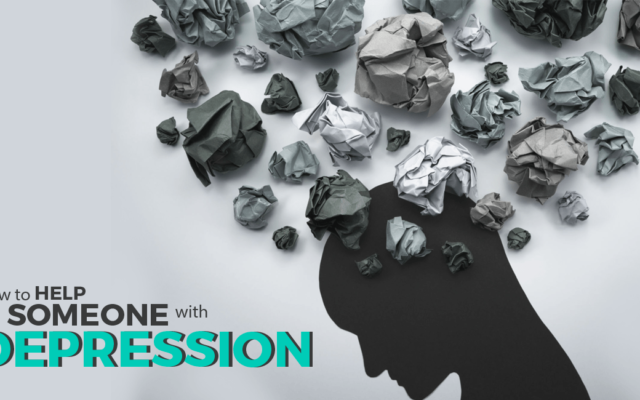To help someone with mental illness, it is important to first properly educate yourself about the kind of mental illness or disorder they are going through. Without communicating with care and understanding, even something small you say or do could cause panic, despair or recall a triggering memory
Understanding Depression
What is depression? It is often thought of as just being sad for a long time, but it isn’t that simple. The factors that contribute to depression are complex and there is a wide range of symptoms someone with depression may experience. Discounting depression to just sadness can negatively impact someone who is depressed, so it’s important to treat people with understanding and compassion.
Sadness is a human emotion that everyone feels and is supposed to feel. Emotions are essential indicators of how we feel about our experiences. Someone is diagnosed with depression when the emotion of sadness heightens, increases, and overwhelms an individual. Depression is a medical condition, not a personal flaw or weakness and that it usually gets better with treatment.
It is important for someone to feel supported by their loved ones when they are experiencing clinical depression. A depressed person may not want to talk about it at length, or even know-how, but criticisms of their symptoms can have a negative impact. Even though prolonged sadness can often lead up to depression, it is not depression. Feeling down or depressed from time to time is normal.
If you are unsure if you or a loved one are depressed rather than experiencing normal sadness, there are a few indicators or symptoms that can help you differentiate.
Symptoms of Depression
Depression is likely if someone is experiencing five or more of the common physical symptoms. This could lead to the diagnosis of depressive disorder. If you think you are depressed, you should contact a mental health professional for assistance. These symptoms of depression can be used as guidelines on whether or not to seek professional care.
The nine symptoms of depressive disorder are:
- Excessive sadness
- Increase or decrease in appetite
- Insomnia or a lot of sleep
- Psychomotor agitation (constant moving of body)
- Loss of interest in things previously enjoyed
- Fatigue
- Suicidal thoughts
- Feeling of worthlessness
- Inability to concentrate
Stages of Depression
Depression is classified as being either mild, moderate, or severe. People with depression may experience one or all three throughout their life depending on their experiences and history of treatment.
Mild Depression
Mild depression is more than just feeling blue for a short period of time. The symptoms of mild depression can go on for days and are noticeable enough that they interfere with your everyday activities.
Mild depression may cause mood disorder like irritability or anger and may cause feelings of hopelessness, guilt, and despair, self-loathing, or a loss of interest in activities you once enjoyed. It can also have physical effects such as difficulties concentrating, a lack of motivation, aches, and pains with seemingly no direct cause, daytime sleepiness and fatigue, insomnia, appetite changes, and weight loss or gain. Finally, it may present in behavioral changes such as reckless behavior with excessive gambling or abuse of alcohol and drugs. People with depression are at an increased risk of suicide.
If these symptoms persist regularly, you may have a persistent depressive disorder.
Even though mild depression is usually noticeable, it is the most difficult to diagnose because it is easy to dismiss the symptoms as something minor or general feelings of sadness causing you to avoid discussing them with your doctor.
Moderate Depression
Even though moderate and mild depression shares similar symptoms, moderate depression may cause problems with self-esteem, reduced productivity, feelings of worthlessness, increased sensitivities, and excessive worrying. For some, it may feel physical, causing headaches or muscle pain.
The most telling difference is that the symptoms of moderate depression are severe enough to cause difficulties and problems at home as well as at work. You may also find significant difficulties in your social life if you are experiencing moderate depression.
Moderate depression is easier to diagnose than mild depression because the symptoms significantly impact your daily life and cause hindrances. If you think you are experiencing moderate depression, be sure to discuss your symptoms extensively and openly with a mental health professional.
Severe Depression
Severe or major depression is classified as having the symptoms of both mild to moderate depression, but the symptoms are so severe that they are noticeable to your loved ones and people around you. Major symptoms of severe depression may also cause delusions, feelings of stupor, hallucinations and risk for suicide.
Episodes of major depression last an average of six months or longer. Severe signs of depression can be treated but needs to be regularly monitored to prevent it from recurring.
What causes depression?
Research suggests that a combination of genetic, biological, environmental, and psychological factors contribute to whether or not a person will experience the symptom of depression.
Depression can also occur alongside other serious illnesses such as cancer, heart disease, diabetes, Parkinson’s disease, and other life-disrupting diseases. Having depression along with another disease can make these conditions worse and vice versa. Sometimes medications taken for these illnesses may cause side effects that contribute to the severity or onset of depression symptoms. Depression may look different for women and men and at different ages. Depression affects different people in different ways, for example:
Women: Women experience depression more than men. This can be attributed to biology, hormones, the stress of life routines, or a combination of factors. Women with depression typically have symptoms of sadness, worthlessness, and guilt.
Men: Men with depression are more likely to be very tired, irritable, and even angry. They often lose interest in their work and the activities they enjoy. The tendency to behave recklessly is also common which can lead to the misuse of drugs or alcohol. Many men do not recognize their depression and fail to seek help.
Older adults: Older adults with depression may have less obvious symptoms and are less likely to admit feelings of sadness or grief to others or themselves. They are also more likely to have medical conditions, such as heart disease or cancer, which may cause or contribute to their depression.
Younger children: Younger Children with depression may pretend to be sick, refuse to go to school, cling to a parent, or worry that a parent or someone they love may die.
Older children and teens: Older children and teens with depression may get into trouble at school, sulk or be irritable. Teens with depression may have symptoms of other persisting disorders as well, such as anxiety, eating disorders, or substance abuse.
Helping a person with depression can be exhausting and requires patience and understanding. It is crucial that you educate yourself and that you don’t underestimate the seriousness of the disorder. Depression drains a person’s energy, optimism, and motivation. Your depressed loved one cannot just “be normal” or “get out of it” so it is important to refrain from using these words and phrases that can hurt your friend with depression.
A depressed friend might decline your invitations to meet up, cancel plans again and again, or ignore calls or texts. Depression can make daily activities, like driving and grocery shopping, feel impossible. Depression makes it difficult for a person to connect on a deep emotional level even with the people closest to them. It is also common for people with depression to say hurtful or rude things and lash out in anger. It is important to remember that this is the depression taking control over your loved one, not your loved one themselves.
When you are suffering from depression, even thinking about doing usual activities that may help you feel better or even something as simple as brushing your teeth can seem exhausting or impossible. Providing an outlet for difficult emotions may help your loved one feel less overwhelmed. Offer
Depression is a serious mental health condition that requires professional treatment. Recovery from depression takes time and there is no way to just “fix” a person. If you are struggling with depression or someone you know is, do not hesitate to ask for help or offer help yourself, it could make the difference.



